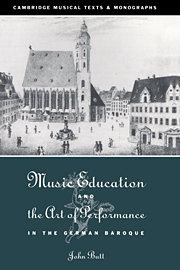Book contents
- Frontmatter
- Contents
- List of plates
- Preface
- Acknowledgements
- List of abbreviations
- 1 The establishment of Lutheran musical practice in the sixteenth century
- 2 The role of practical music in education c. 1600-1750
- 3 The contents, layout and style of instruction books
- 4 The development of performance practice and the tools of expression and interpretation in the German Baroque
- 5 Ornamentation and the relation between performer and composer
- 6 The decline of the Lutheran cantorates during the eighteenth century
- Notes
- Bibliography
- Index
6 - The decline of the Lutheran cantorates during the eighteenth century
Published online by Cambridge University Press: 03 December 2009
- Frontmatter
- Contents
- List of plates
- Preface
- Acknowledgements
- List of abbreviations
- 1 The establishment of Lutheran musical practice in the sixteenth century
- 2 The role of practical music in education c. 1600-1750
- 3 The contents, layout and style of instruction books
- 4 The development of performance practice and the tools of expression and interpretation in the German Baroque
- 5 Ornamentation and the relation between performer and composer
- 6 The decline of the Lutheran cantorates during the eighteenth century
- Notes
- Bibliography
- Index
Summary
This study has thus far centred on the musical period commonly termed the Baroque; as chapter 2 suggested, this is the era of the greatest flowering of Lutheran church and school music. Nevertheless, both the changes in educational stance and the internal developments of music as a specialist art, growing away from its academic roots, sowed the seeds for the eventual demise of this rich tradition. This final chapter examines the literature relating to this period of decline, from three angles: evidence for the stagnation and decline of many cantorates; new developments in performance practice and pedagogic stance and their influence on the more secure establishments (and thus a continuation of chapters 4 and 5); and finally, a consideration of changing attitudes to the function and status of music (thus concluding the study of such topics in chapter 2).
DECLINING STANDARDS OF PRACTICAL MUSIC INSTRUCTION
There are many indications that the standards of singing both in school and in German musical life had declined precipitously by the mid eighteenth century. One first-hand report even suggests that the choir of the Thomasschule in Leipzig was virtually non-existent in the last years of J. S. Bach's life (see Fröde 1984); Quantz alludes to the general poorness of singing in German schools (1752, ch. 18/80), and Agricola states at the outset of his translation of Tosi's renowned singing treatise that the Germans have not perfected singing to the same level as the Italians.
- Type
- Chapter
- Information
- Music Education and the Art of Performance in the German Baroque , pp. 166 - 192Publisher: Cambridge University PressPrint publication year: 1994



